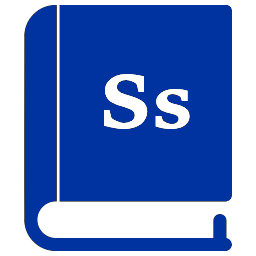Soundtrack - Syncopation
Slancio - (Italian) "surge, movement"; keep moving with enthusiasm
Slargando - (Latin) "slowing"; a gradual decrease of tempo; slowing down
Slentando - (Latin) "slowing"; a gradual decrease of tempo; slowing down
Slide - an apparatus of brass instruments which changes the length of the tube as well as the pitch of the tones produced; musical notation symbol instructing string performers to move quickly between notes without pause or break; a hollow tube held or placed on a finger for 'sliding' up or down the strings
Slur - tie; bind; legato; play the notes with no accent or separation
Smorzando - (Italian) "weaken"; to dampen the sound intensity, often including the tempo; a reduction in the sound dynamics
Soave - (Italian) "gently"; play in a soft, smooth, and gentle manner
Soft pedal - the left piano pedal which lowers the volume of tones
Sognando - (Italian) "dreaming"; dreamily; fantasizing; daydream; contemplating
Solene - (French) "solemn"; play solemnly or a dignified manner
Solfège - (Italian, English, French); a method of music education teaching various musical systems of tone identification and use; see solmization
Soli - (Italian) "alone"; a piece of music written for a single performer; a performance given by a single vocalist or instrumentalist alone or accompanied
Solmization - (Italian) "alone"; a system of applying distinct syllables to a scale for tone identification; Example: 'Do Re Mi Fa So La Ti Do'
Solo - (Italian) "alone"; a piece of music written for a single performer; a performance given by a single vocalist or instrumentalist alone or accompanied
Solo break - the Jazz music section where a player performs an improvised solo
Soloist - the singer or musician who performs the solo
Somma - (Italian) "sum"; total; complete; great
Sonata - (Italian) "to sound"; a musical composing form originating in the 16th century, renowned from the Baroque period for violin solos, and a 19th century developed form of modern opera; a three movement form of an allegro, a cantibile, and a finale later becoming a stand alone orchestral composition with a showcased solo instrument; see Sonata form for more info
Sonatina, sonatine - ( Italian) "smaller sound"; a short light 'spin-off' of the sonata from the 18th century used up to today (21st century) usually written for piano; little sonata
Song - a musical composition with lyrics sung with or without accompaniment
Song cycle - a group of songs performed as a single composition with a common musical theme or idea in common; a musical form developed in 19th century Germany; see song cycle form
Songwriter - "one who writes songs"; a person who writes musical compositions, with or without lyrics; a musical composer of music and/or lyrics; see also lyricist
Sonore, sonora - (Latin) "sound"; ringing sound which continues after a tone
Sopra - (Italian) "highest"; piano left-hand over; directive to cross hands
Sopranino - (Italian) "highest"; instruments with a pitch range equal to soprano
Sordina, sordine, sordino - (Italian) "mute"; a mute; mute or dampen the sound
Sortita - (Italian) "emerge"; the principal singer's first appearance in a opera; the first aria in an opera
Sostendo - (Galacan) "holding back"; hold back
Sostenuto - (Italian) "sustained"; a direction to hold a note for its full time value
Sotto voce - (Italian) "under the voice"; to sing or play in a barely audible manner; play very softly
Soubrette - (French) "conceited, coy"; a soprano female opera performer often with the role of a flirtatious or cunning household servant
Sound - a pitch frequency vibration which is audible to the human ear
Soundboard - a thin wood sheet or strip under the strings of a piano or other instrument for enhancing the sound produced
Sound box - the hollow body of a stringed instrument which resonates and/or amplifies the sound produced
Soundtrack - the synchronized recorded music of a book, film, movie, television presentation, or video; the synchronized audio recording of a film, movie, or television presentation including music, vocals, and sound
Sousaphone - a brass instrument known as the bass tuba invented by John Philip Sousa in 1893 for addition to marching bands
Spianato - (Italian) "smooth"; play in a smooth manner; smooth out
Spiccato - (Italian) "separated"; a string direction play notes in a staccato-like detached manner by bouncing the bow off the strings; sautillé
Spinet - 17th century keyboard instrument for private or domestic use rather than public performance
Spirito - (Italian) "spirit"; play in a fast tempo or spirited manner
Spiritoso - (Italian) "spirit"; play in a fast tempo or spirited manner
Spiritual - a religious folk song originating in mid 18th century America and a predecessor of Gospel worship music; any music pertaining to religious worship
Spirometer - an apparatus for measuring the volume of air taken in and exhaled through the lungs which measures ventilation and air movement using two ventilation patterns, obstructive and restrictive
 Staccato - (Italian) "detached"; direction to play the notes in a detached or separated manner by slightly shortening it's time value; notation symbol of a dot above notes; Right: staccato
Staccato - (Italian) "detached"; direction to play the notes in a detached or separated manner by slightly shortening it's time value; notation symbol of a dot above notes; Right: staccato
Staff - the five line frame upon which musical notation of the major and minor scaling system is placed for composing scores
Stanza - the verse of a song
 Stem - the vertical bar or line extending from a note's head; Right: stem
Stem - the vertical bar or line extending from a note's head; Right: stem
Stentando - (Italian) "hard"; something that is hard to do, heavy, or difficult
Stentato - (Italian) "heavy"; something that is hard to do, heavy, or difficult
Steel band - a group of percussion instruments made from oil drums invented in 1930s West Indies and played at carnivals
Stop - to deaden a string's sound with a finger or bow; muting a horn by cupping the hand over the bell; a sound inhibiting lever or pedal on keyboards
Stornello - (Italian) "freely"; improvisation; with an improvised appearance
Strascinando - (Italian) "dragged"; play in a heavily slurred manner; blend the notes in sequence
Strascicante - (Italian) "dragged"; play in a heavily slurred manner; blend the notes in sequence
Strepitoso - (Italian) "noisy"; noisy or forceful; impetuous or implusive
Stretto - (Italian) "narrow"; directive to hasten or play faster; a denser passage of the fugue subject to different voices
Stringendo - (Italian) "tightening"; gradually faster; accelerate the tempo
Strings - the group of instruments played by bowing, plucking, or strumming strings; an instrumental family of stringed consorts
Subito - (Italian) "sudden"; sudden change of dynamics; pianissimo; see dynamics
Suite - (French) "after, continuous"; a musical composing form developed in late 14th century originally for dance and later revived in the 17th as an instrumental symphony of continuous movements, mostly replaced by the sonata form
Suono reale - (Italian) "real sound"; the actual sound of written harmonics
Sur la touche - (French) "touch"; direction for strings to use the bow over the fingerboard part of the instrument
Sustain - to hold a note longer than it's normal time value; a lever or pedal of keyboard instruments which allows the sound to ring or continue longer
Symphony - a large scale composition and performance for an orchestra, typically in four movements
Syncopation - an intentional interruption of the rhythm in order to place emphasis or accent on the weaker beat common in many modern musical forms


